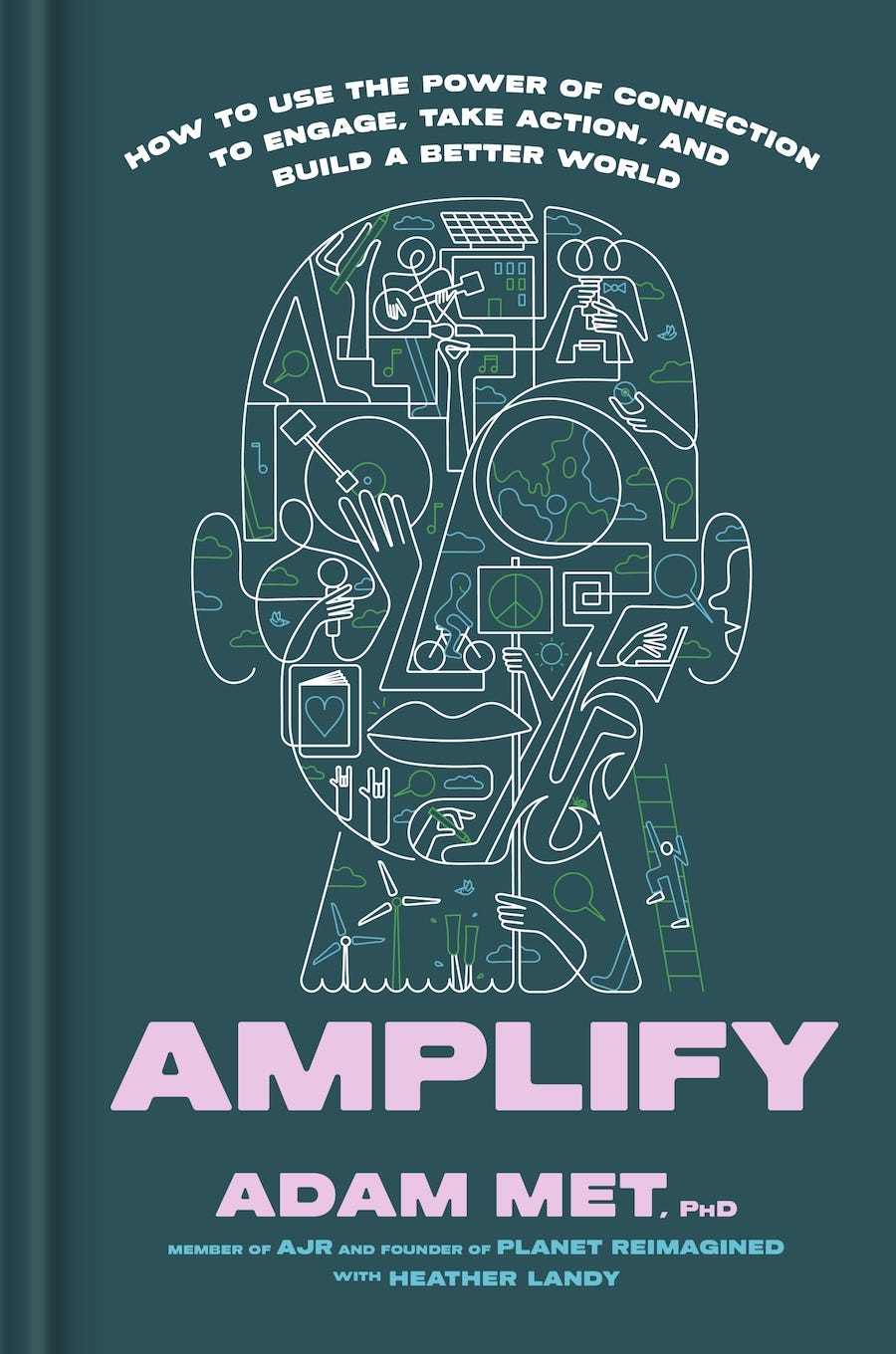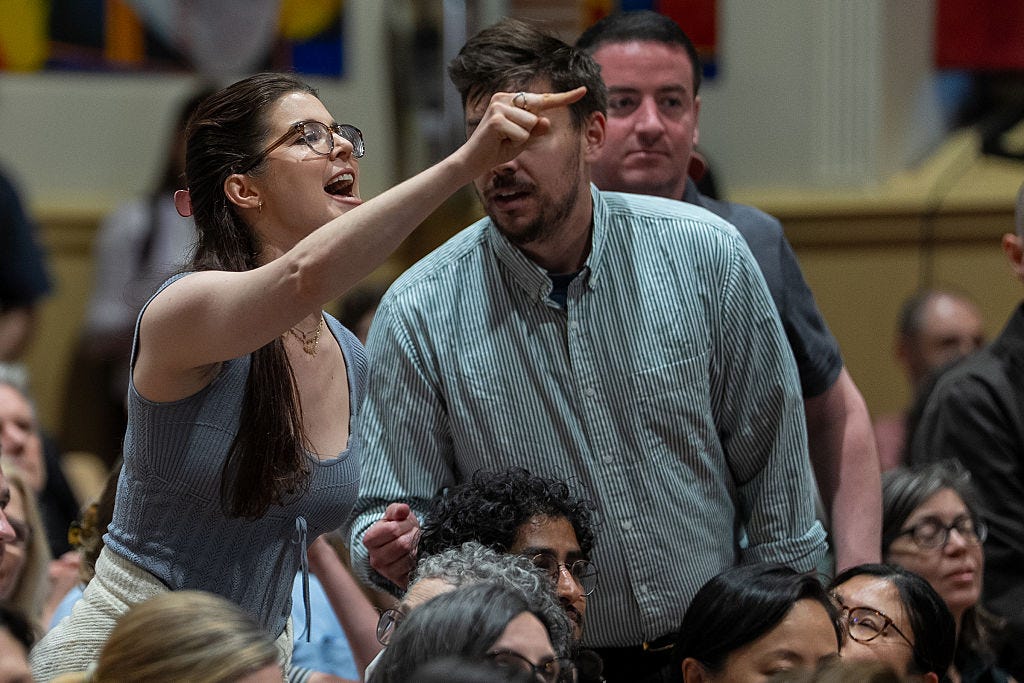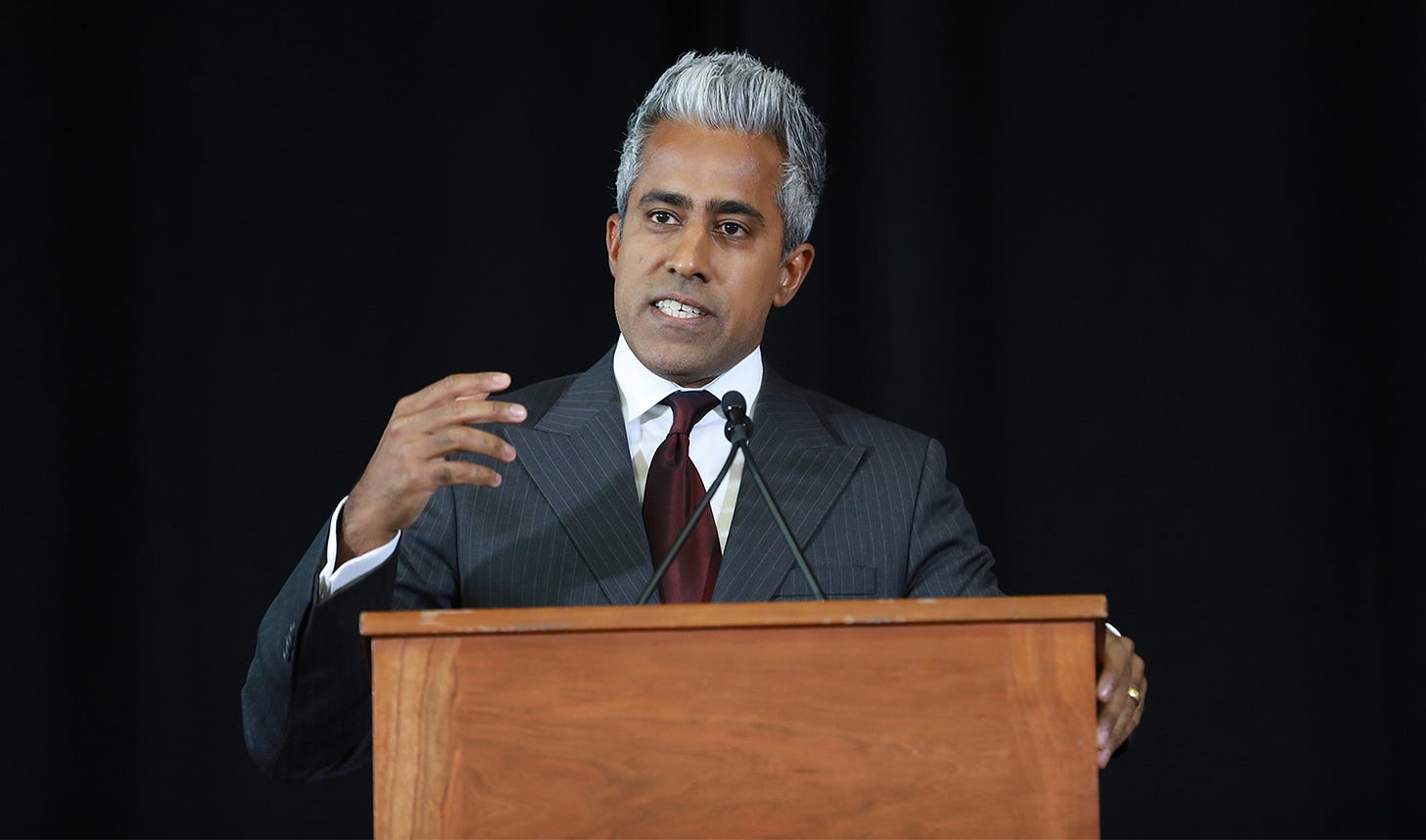I’ve been seeing commencement addresses popping up here and there. Unfortunately, I’m the kind of person who is invited to do everything exactly once. Not sure what it is about me…
So I thought I would share the one and only commencement address I have ever given, to my former high school, Sidwell Friends.
“You will rewrite the rules of the world”
Commencement address to Sidwell Friends School
June 9, 2023
Bryan Garman, one of the finest teachers I’ve ever had; faculty and staff of this school that molded me; parents and caregivers; visiting Canadian smoke; and you, bright, shining graduates:
The task of the high school commencement speaker is to give older-person life advice to people who hate older people giving them advice.
Hey, I get it. Your generation already gets so much bad advice.
Don’t spend $10 on avocado toast; invest in avocado toast futures! Don’t buy coffee on the way to work; inherit a coffee shop chain!
It’s like: “Here’s a broken world. May we offer you some life hacks?”
But let me say: Just because your parents have left you a broken world, doesn’t mean they don’t love you. It just means they love other stuff more. Like Range Rovers and lobbying.
Today is a special moment for any family, because right around now an invisible milestone is crossed: Every meal you have with your family from now on is optional. So if your elders are sentimental, hug them. They see the arc of life bending. They used to change your diapers. Soon, you’ll change theirs.
Today you make a new beginning. But the burden of your generation is that you make that beginning in a moment in history full of the fear of endings. You hear it all around you: liberal democracy is doomed, the American dream is dead, truth itself is in peril, the earth is toast.
Happy Graduation!!! Your present is smoke.
Subscribe now
When Bryan asked me to give this address, here was the question that came to me: When the world feels like it’s ending but you are only just getting started, how might you build a good life?
The first invitation I want to make to you — I’m offering invitations, not advice — is to rewrite the rules of the world.
The failure of previous generations to solve our gravest problems is your inheritance. But it includes a gift that comes to few generations in history: a chance to reject the dogmas of old and, in the words of James Baldwin, “begin again.”
As much as any generation in history, yours has earned the right to reimagine the world.
Take climate. Bad. Very bad. And yet it is the very direness of the situation that has given your generation newfound power.
If our institutions were working fine, the climate issue would have remained narrowly about climate — about tax credits and wind turbines. But because our institutions are not working fine, your generation has stepped up, sat in, grabbed the bullhorn, and changed the conversation.
Because of you, the climate discussion is no longer just about 1.5 degrees Celsius. It’s about redrafting our social contract, reckoning with capitalism, redressing racial injustice, and rebuilding the physical landscape of our societies in order to solve the climate crisis. And it’s about using the climate crisis to solve these things we should have solved a long time ago but lacked the guts.
Your generation understands what prior generations failed to: that the fight for an earth we can live on can’t just be about doom and sacrifice. That people aren’t really motivated to make stuff less bad. That we must invite people in to a thrilling, purpose-giving project to create better societies.
Leave a comment
Or take gender. Once again, your inheritance is a hot mess. The patriarchy is in full-fledged revolt against a world trending toward equality. Millions have been radicalized to fear trans and nonbinary people as an existential threat.
But here, too, the hot mess you inherit is a permission slip. You have a freedom now that few in history have had to reimagine a world liberated from the fetid jail cells of gender.
And you’re already doing it. Your generation is redefining masculinity, testing out new ways of being a man not rooted in dominating women. You are fighting in defense of gender diversity and the freedom of people to be who they are.
That fight isn’t just for some of us. It’s for all of us who, at some moment or other, have been caught in the straightjacket of gender dogmatism. Every boy who’s ever cried and been told not to, or who happened to prefer art to football. Every woman crushed by the relentless pressure to look, talk, think, and smile in a certain way.
Anyone who has TikTok knows that your generation has a talent for seeing through adult lies and hypocrisies, and of thinking for yourselves. The world needs your reimagining. Multi-racial democracy — how do we realize it? Capitalism — reform or overthrow? Housing — commodity or right? What role should work play in our lives now? Should we abolish offices?
Should we abolish podcasts?
You have a chance to ask and answer more fundamental questions than most generations get to. You will rewrite the rules of the world.
Now to my second invitation: Even as you rewrite these rules — an ambitious task — your generation will be called to redefine ambition.
Look: The fact that you are here means you have survived a “Hunger Games” ambition gauntlet. You have had to cultivate the kind of ambition that tells you to stay up another hour when your teenage body is begging you to rest. You’ve submitted to endless structure at the expense of exploration and connection. Perhaps you’ve had to suppress the wilder parts of yourself to develop the meritocracy-conquering, college-bound self.
That kind of ambition got you here. But it won’t get you where you’re going — if where you want to go is a fulfilling life, not a depleted one.
Many adults won’t tell you the truth about this, sometimes because they’ve lived depleted lives themselves and they feel it’s your turn now. Or because they worry you will struggle if you don’t have that manic drive. Or because schools and colleges benefit when you make a ton of money and donate to them, even if your soul is shriveling.
Let me be the grown-up with no dog in the fight who tells you there is another way.
I’m not saying abandon ambition. After all, for two decades I have been plotting to be your 2023 commencement speaker. Ambition works.
I’m not saying be less ambitious. I’m saying be ambitious about your whole life, about everything, not just your work and your career.
Be ambitious about cooking people meals that make them remember their grandmother. Be ambitious about being the first friend people call — not text — after the oncologist calls them.
Be ambitious about everything: About how interesting a partner you are, about the new thoughts you bring your love when you get a babysitter and sneak out for dinner. About the parties you host. About the gestures you make as a neighbor. About making friends.
Leave a comment
Because let me tell you: Unlike friendship when you’re 23 with great skin, adult friendship is not automatic.
And redefining ambition doesn’t just mean balancing work and personal life. It also means rethinking what it is to be ambitious about work.
Pursue the ambition of a craft, not of a career. There’s a difference.
A craft is a basic activity you dedicate yourself to day after day, decade after decade, like batting practice. My craft is making sentences. Painting is a craft, editing film is a craft, designing buildings is a craft, drafting arguments is a craft, butchering hogs is a craft, writing code is a craft, organizing neighborhoods door to door is a craft.
Too many people chase career success more than craft and end up with neither. If you commit to doing something particular and focused really well, and obsessively try to get better at that thing, you will find your career and your success. Don’t obsess about how to rise. Obsess about getting really, really, scarily good at something.
And don’t do work you don’t believe in. Frankly, I trust your idealism right now. But soon there will be apartments to buy, dates to take nice places, children to send to expensive schools. Your idealism will be tested. You might tell yourself, “I did want to study law to defend human rights, but corporate law is cool, too, right?
It’s not.
Too many people with top-shelf educations go on to lead lives of professional misery, surviving on rationalizations, coming home to their families morally emaciated, because it’s draining to spend your life pretending to believe.
Don’t get degrees you don’t want. Don’t choose work based on fear — especially the fears of your elders. Don’t use your eventual partner’s and kids’ alleged needs to justify an immoral career.
Remember: Being set up to make the most money possible isn’t why you came to this school.
It’s why your parents sent you here.
And, by the way, this invitation to redefine ambition isn’t just about you having a good life. It’s also about you being able to fix a world in crisis. Because we’re not going to fix what’s broken in the world with the same ethic that broke things.
You know the ethic. The one that says never rest. Join clubs that will get you into the Ivies, not those that feed your soul. Pursue a C.V. at any cost, even to connection and friendship. That ethic is the high-school-kid variant of the virus that, in its adult form, has wrecked everything: the extractive, slash-and-burn, me-first orientation that brought us unlimited money in politics, unlimited oil drilling, unlimited billionaire hoarding, unlimited power lust by authoritarians.
A new kind of society will require a new kind of ambition.
A more sustainable earth will not be realized by people who work unsustainably, treating their bodies like fossil fuels to be extracted at any cost. A multi-racial democracy that listens to every voice and moves beyond domination and supremacy will not be realized by people who believe the right things on paper but sustain the old cultural habits of talking more than listening and needing to dominate every meeting. A more humane economy and more vibrant communities will not be realized by people who don’t know how to turn work off and invite their people over and cook for them. The right of people to be who they are and love who they love will not be realized by people who don’t give themselves space for being and loving.
Leave a comment
My third and last invitation is: reclaim the idea of America.
I’m going to make an assumption that most of you here are in the camp that still believes in liberal democracy, still believes in evidence-based reality, still believes in the ideals of freedom and justice for all. (If you’re not, welcome anyway. We’re recruiting.) If you believe in those things, this has been an era of despair in American life. But I believe that we on the pro-democracy side of things tend, in our despair, to make two big mistakes.
First, we rightly criticize what needs fixing. But we forget we are doing so because there is something good and noble in America worth fighting for.
Second, we rightly push back on the foes of progress. But we forget that they are having their little moment precisely because of our progress.
Forgetting these things, we fall into a funk. We get down on America and despair about the future, and we fail to remind people what we’ve won and what we’re for and not just what we’re against. We make change sound impossible. And, to be honest, we come off like losers.
And we’re not. In fact, we are falling on our face right now in America because we are jumping high. And it’s time we told that story.
Share
For your generation, I know even saying there is anything worthy in the idea of America is what you might call “cringe.” Because you are, rightly, so attuned to America’s failings.
But let this washed-up geriatric boomer millennial challenge you for a moment. Believing in America, reclaiming the idea of America from fools and bigots, is not cringe. It’s how we get the progress and freedom we seek.
If our general vibe is that America irredeemably sucks, is irredeemably racist and patriarchal and genocidal and heteronormative and ableist and you-name-it — first of all, we are going to lose every contest for hearts and minds. Being a turnoff is not a political strategy.
But it’s not just bad strategy. It’s also not true.
I believe you can be clear-eyed about the injustices and violence and hypocrisy America was built on — and still see the promise of its story.
This is a country founded on incandescent ideals its own founders were not brave enough to live. A country that has tried to get better, like people do. Tried to get truer to what it said. A country that has made real progress, progress often achieved by those America loved least, loving America enough to strive to make it better.
Every generation, there has been a struggle over whether to build a bigger “we.” Whether to extend the blessings of liberty and justice to more people. Struggles over slavery, the protection of farmers and factory workers, women’s suffrage, labor unions, a safety net and old age insurance, racial integration, voting rights, poverty, clean air and water, human ability, the right to love and be.
Each struggle was grueling. In the eye of those storms, progress hardly felt inevitable. It wasn’t inevitable. But over the long run, again and again, the small-hearted faction has been defeated, and the quest for a bigger “we” has won.
Remembering that helps put today’s American fascist movement in its context and its place.
This is not some bold new movement of the future. It is a movement of backlash. It is the same small-hearted faction we know from our past. This movement is not steering the ship of our republic. It’s a barnacle on the hull of our progress.
And our progress is real, and it is good, and it is worthy of celebrating loudly and proudly.
Because if we don’t claim our progress, the story of that progress will be turned upside-down and weaponized into a dystopian tale of groomers, wokeism, and critical race theory. We need to be evangelists for our progress, cheerfully spreading the good news.
America isn’t just a country that’s done bad things. It is. But if you have the chance to travel the world, as I’ve been privileged to do, you’ll also realize that America is trying to do something remarkable and rare: create a country forged of the world, made of all the other countries, a country that takes people from everywhere and turns them into the fullest versions of themselves. A country without a shared race or ethnicity, shared religion, shared first language, uniting people instead by values. It’s a dazzling vision no great power in history has ever reached for. And we’re closer than we realize to achieving it. We’re falling on our face because we’re jumping high.
And if young people like you don’t proudly claim this vision, don’t invent your own authentic patriotism, the loudest voices talking about these changes will be those trying to stop them dead.
So, my dear class of 2023, these are my invitations to you: reclaim the idea of America; redefine ambition; rewrite the rules of the world.
And before I send you off, let me salute those who raised you. Let me celebrate your teachers for bringing out your talents. And let me congratulate you. Today you enter adulthood. The world literally can’t wait for what you’ll do with it.
Photos: Courtesy of Sidwell Friends
This post was originally published on The.Ink.
















